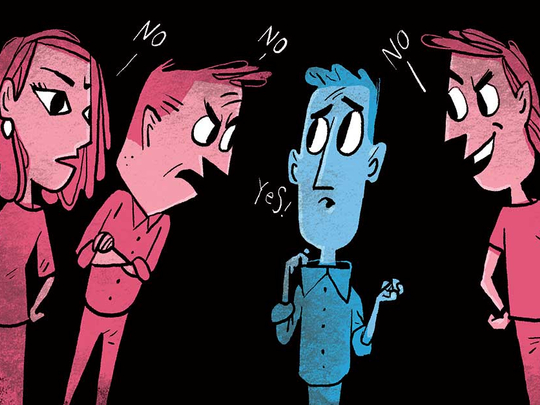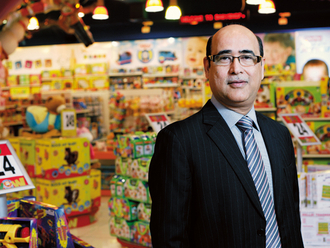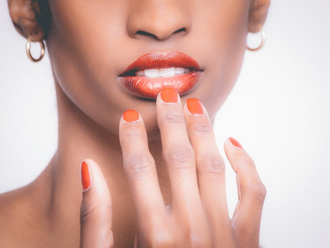
Dubai: Imagine this, you are having a conversation with a group of friends, when you mention a new television show that you have started watching. However, one of your friends is dismissive about it and everyone else agrees. You might have really liked the show, but not wanting to debate the issue, you go along with the crowd. This is peer pressure.
On a daily basis, many of us experience this phenomena, be it for something quirky and harmless, or something more dangerous, like picking up smoking.
According to a study published by the US-based American Psychological Association, peer pressure begins “as soon as children start to pay attention to what other children think about them”. Teenagers, however, are more susceptible to the pressure, the study goes on to state, because “their brains derive more pleasure from social acceptance than adult brains”.
When we posed the question to our Gulf News readers, about whether they had done something due to peer pressure, the majority consensus was in the positive.
Fatima Suhail, a freelancer based in Sharjah, was one of them. When in university, she noticed that majority of her friends had two ear piercings and just to fit in, she got them, too. However, the decision did not work in her favour.
She said: “This decision of mine was strongly opposed by my family, but I somehow convinced them and went ahead to get it done. The process wasn’t very painful. However, soon after, there was severe bleeding followed by an infection in both my ears. The piercing happened to be done at the wrong spot that damaged my nerve endings.”
At home, she wasn’t shown any leniency and was instead reprimanded for her decision. “I still regret it, the pain and money spent wasn’t worth it,” she added.
Shivam Manghnani, who works in the accounts department of a Dubai-based company, was a huge fan of the Star Wars series growing up. When he watched Star Wars: Episode I – The Phantom Menace, he thought he didn’t like it. Why? Because he had read multiple reviews beforehand about how it wasn’t a good fit for the series.
He said: “A lot of people said they didn’t like Jar Jar Binks character. People were saying this movie was a mockery of the Star Wars name. When you are young, it is easy to be influenced. But, as I grew up, I started to realise that I did like the movie afterall.”
C. S. Ravi, a chartered insurance practitioner based in Dubai, has done several things under peer pressure, including buying branded items including clothes and cars and trying out food he wasn’t inclined to.
He said: “I am not always influenced. But, when I am, it is sometimes an exciting aspect, but on a few occasions it was very disappointing. I think we should just be ourselves and act based on our needs, character, income and likes instead of being influenced by others.”
Brijesh V. B., head of policy services at a Dubai-based company, bought an iPhone under peer pressure. An Android user, he was surrounded by the Apple brand at work and had to switch just to fit in.
He said: “People believed it to be a status symbol. So, I was forced to buy one. I didn’t even have the budget, but ended up spending Dh4,500. Luckily, I didn’t regret the decision after I started using it.”
He believes that majority of the people who get influenced is because they are trying to fit in and don’t want to be the odd one out. Another time he was forced into doing something was when he applied for his driver’s licence.
He said: “Everyone around me had one and they kept asking me why I didn’t. I never planned to apply because I wasn’t confident in my driving skills. But, I went ahead and applied for a licence because of peer pressure. After failing three times, I did succeed. But, I have never driven since because I believe I am not a good driver.”
Ishfaq Mir, a store manager based in Dubai, tries his best not to succumb to peer pressure because he has realised that it involves things that often lead to regret.
He said: “If I really want to do something, I’d rather do it myself, of my will, rather than be pressurised into doing it. Habits like smoking and drinking are often results of peer pressure; they start as a one time thing and eventually become an addiction. The person ends up regretting later, when they become more mature and understand things better.”
He does, however, believe that younger people are more prone to fall for peer pressure. They feel a need to fit in and “do not want to be left out by not doing something that their friends are doing”.








